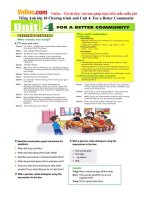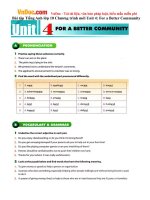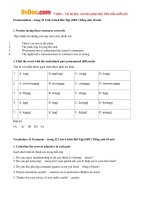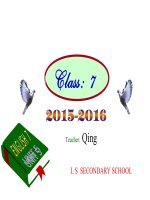Unit 04 For a Better Community Lesson 2 Language
Bạn đang xem bản rút gọn của tài liệu. Xem và tải ngay bản đầy đủ của tài liệu tại đây (166.52 KB, 10 trang )
<span class='text_page_counter'>(1)</span>Lesson 2. Language • Vocabulary 1. Read the conversation and find adj ending with the following suffixes - -ed: ______________________________ Disadvantaged, interested, excited - -ing:______________________________ interesting - - ful: ______________________________ Useful, helpful, meaningful - - less: _____________________________ hopeless.
<span class='text_page_counter'>(2)</span> 2. Use the words in brackets with appropriate endings from 1 to complete the following sentences. 1. If people spend most of their time doing nothing, they will meaningless find their lives _________(mean). interested 2. I am __________ in doing charity work. (interest) hopeless 3. Last year, she was really ____________ at English. She couldn’t even say a word in English. Now her English is much better. useful 4. The new teacher’s advice was very ___________. His students could learn English vocabulary faster. (use) excited 5. They were __________ to know that their contributions meaningful were ___________ to the poor people in that area. (excite, mean) exciting 6. Our school volunteer activities are very ________. (excite).
<span class='text_page_counter'>(3)</span> The difference between –ed and –ing adjectives * ed adjectives Adjectives that end ‘-ed’ describe emotions – they tell us how people feel about something. - I was very bored in the maths lesson. I almost fell asleep. - He was surprised to see Helen. She’d told him she was going to Australia. - Feeling tired and depressed, he went to bed..
<span class='text_page_counter'>(4)</span> * -ing adjectives Adjectives that end ‘-ing’ describe the thing that causes the emotion – a boring lesson makes you feel bored. - Have you seen that film? It’s absolutely terrifying. - I could listen to him for hours. He’s one of the most interesting people I’ve ever met. - I can’t eat this! It’s disgusting! What is it? * Remember that people can be boring but only if they make other people feel bored. He talks about the weather for hours. He’s so boring. NOT I was very boring at the party so I went home..
<span class='text_page_counter'>(5)</span> Compare the difference: - My girlfriend is bored. - (My girlfriend feels bored) - My girlfriend is boring. - (My girlfriend is a boring person) You can use these adjectives to describe people or situations but be careful that you are using the correct adjective. For example, there is a big difference in meaning between: - I am confused. - (I don't understand something) - I am confusing. - (I will cause you to be confused).
<span class='text_page_counter'>(6)</span> Adjectives end in –ful or -less • Most adjectives which end in -ful make the negative with -less. But, not all Noun Verb Adjective care. care. careful/careless. harm. harm. harmful/harmless. help. help. (un)helpful/helpless. hope. hope. hopeful/hopeless. pain. pain. painful/painless. power. power. powerful/powerless. use. use. useful/useless. thought. think. thoughtful/thoughtless. taste. taste. tasteful/tasteless.
<span class='text_page_counter'>(7)</span> The adjectives in this table take -ful or -less, but not both.. Noun. Verb. Adjective. count. count. countless/countable. end home peace play price. end play price. endless homeless peaceful playful priceless. success. succeed. (un)successful. truth. -. (un)truthful/(un)true. worth. worth. worthless.
<span class='text_page_counter'>(8)</span> Pronunciation 1. Listen and repeat.
<span class='text_page_counter'>(9)</span>
<span class='text_page_counter'>(10)</span> Grammar I. Irregular past tense verbs. I wore jeans to school yesterday My sister and I bought a lot of clothes last summer. My father read newspapers in bed last Sunday. My mother made my bed last Sunday I wrote letters to my granparents yesterday afternoon.
<span class='text_page_counter'>(11)</span>









